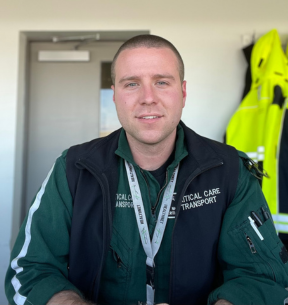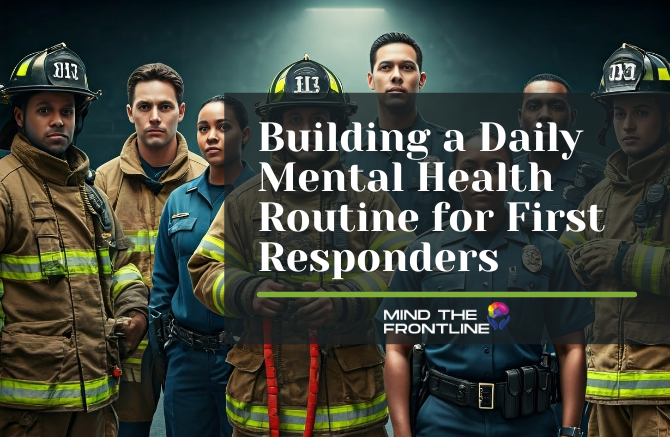Building a Daily Mental Health Routine for First Responders
First responders face unique mental health challenges due to the nature of their jobs. Building a daily mental health routine can be a powerful tool...
6 min read
 Nick Carson, FP-C, CCP-C, TP-C, NRP, B.S
:
Mar 18, 2024
Nick Carson, FP-C, CCP-C, TP-C, NRP, B.S
:
Mar 18, 2024
-2.png)
In Greek Mythology, the River Styx separates the land of the living from the underworld, souls that have departed require safe passage across this river by way of a ferryman named Charon and his boat. It was a fundamental belief that if a person died, they would need money to pay the ferryman for this journey. Family members would place a small token called an Obol in a loved one’s mouth to ensure they have what they need to pay the toll.
The care of the human soul after death was a deeply rooted value in ancient traditions. Rituals around death are sacred and believed to protect the soul’s transition from the world of the living to the land of the dead. Traditions like these can be found in cultures all over the world.
From the Vikings, to the Native Americans, rituals around death are steeped in formalities, customs, and meticulous care for the loved members of the group when they die.
-Jan-24-2024-05-05-59-9940-PM.png?width=300&height=196&name=MTFL%20%20Blog%20Hero%20Image%20(10)-Jan-24-2024-05-05-59-9940-PM.png)
The Effects of Trauma on the First Responder
As a first responder, exposure to death is inevitable, all but a guarantee. The responder community has finally fostered a culture where trauma is a bit more understood, and the stigma is slowly becoming less prevalent. Great providers do not need to suffer alone. They no longer need to fade slowly into the dark without support. It seems that there is a much better understanding of the effects of a traumatic experience.
Terms like Acute Stress Reaction, Post-Traumatic Stress Syndrome, and Post-Traumatic Stress Disorder (PTSD) are often used as definitions of the mental health effects providers experience after a particularly terrible experience. Some of these events are so horrible that even professional mental health providers struggle to protect themselves against secondary trauma.
-4.png?width=300&height=196&name=MTFL%20%20Blog%20Hero%20Image%20(12)-4.png)
Death Accumulation
For some time, the only tool used at many agencies was a PTSD diagnosis. The DSM5 defines this as The person who has been exposed to actual or threatened death, serious injury, or sexual violence. In many providers, this might not be a perfect fit. A 75-year-old patient with congestive heart failure who will die in the Intensive Care Unit (ICU) might not be considered a “traumatic” event to most providers in the field. Based on the statistics, only 35% of these patients will live past the next 10 years (Jones, 2019).
We can agree that this is not an unprecedented event and likely would not be characterized by most as a “traumatic” event because it is expected. It is hard for the provider to categorize an expected death from a chronic condition as trauma, does that label really fit?
If a medical provider had a patient die from a chronic condition would this constitute a mental health event for the provider? What if that provider had 50 people die in one year working in the Unit?
At what point do these experiences start to add up? Even if death is expected, it is a powerful, impactful event that adds one more straw to the camel’s back.
-Jan-24-2024-05-06-00-3249-PM.png?width=300&height=196&name=MTFL%20%20Blog%20Hero%20Image%20(11)-Jan-24-2024-05-06-00-3249-PM.png)
Burnout
As we think more about the accumulation of experiences leading to a deterioration of mental health, the term “Burnout” has become a mainstay.
The common definition of Burnout is “excessive workload, lack of control over one's work, insufficient support, and conflicting demands”. If that medical provider had all the resources they needed, adequate support, and no conflicting demands, would this accumulation of death still lead to a negative headspace?
As the responder experiences the weight of this accumulation, burnout might be another label that doesn’t quite match the experiences inside their head.
-2.png?width=300&height=196&name=MTFL%20%20Blog%20Hero%20Image%20(13)-2.png)
Moral Injury
The concept of Moral Injury was first discussed by Dr. Jonathan Shay in his book Achilles in Vietnam: Combat Trauma and the Undoing of Character. Shay's concept of moral injury involves the “deep psychological and emotional wounds resulting from experiences that go against one's sense of morality, leading to feelings of betrayal, guilt, and shame” (Shay, 1994).
This book discusses the ramifications of how the impact of a moral injury can extend to spiritual and ethical definitions. This is where many experiences around death begin to touch the soul. Many providers are called to render aid in the acute phase of the incident and are not privy to the dignified exit from this world that we see in the rituals of ancient cultures like Charon and the River Styx.
The first responders are just that, first responders, designed to render aid in the immediate action phase of the incident. Airway, breathing, and circulation are initial priorities that quickly rush into the first few seconds of an assessment.
Nothing in the National Registry of EMTs discusses how to cope with the death of patients. Each patient that dies can be a cut on the fraying rope that connects the responder’s soul to the work they do. Once enough cuts are made, the rope will snap and the tether to the job they love can begin to drift away.
A mental health worker once described moral injury as “actions or inactions contradicting what you believe to be true”. In this context, the moral contradiction at play is that first responders solve problems and save people. When the patient dies, this does not match the fundamental belief of what first responders believe to be true about emergency care. We save people.
-2.png?width=300&height=196&name=MTFL%20%20Blog%20Hero%20Image%20(16)-2.png)
Strategies and Solutions
Strategies to begin addressing this problem are to accept that it is happening. By understanding the definitions of the different types of mental trauma the human brain is subject to, it is easier to identify the most accurate explanation of what is at play. The first responder needs to be in touch with what they are feeling sometimes. Sometimes, we are so raw that we apply substances like alcohol to make sure we don’t feel anything. Many providers experience frustration if moral injury is treated like PTSD or Burnout is treated like an Acute Stress Reaction. The correct key must be matched to the lock, not just any key will work.
Often, it can take some time just to identify what the lock is before you can start to find a key. Responders might find themselves frustrated when a peer attempts to label the experience incorrectly. This is done through self-awareness, therapy, peer support, and discovery.
Effective identification of feelings and mental processes is at the core of positive growth. Much like an office cubicle on a corporate business floor, it can be easy to feel alone. Small, confined to a box, isolated from others. By standing up, it becomes apparent that there are many other cubicles like it. Close together, connected, experiencing similar conditions, all filled with people, humans that are moving through this world at the same speed. This can be traced to Maslow’s Hierarchy of Needs related to love and belongingness needs. “After safety needs are fulfilled, people seek social connections, love, and a sense of belonging. This involves forming relationships, friendships, and being a part of social groups”.
Without this structure in place to support emergency responders, death accumulation may start to isolate the responder, dimming the mind into darkness. Peer support teams, mental health counseling, substance abuse treatment, health services, and support are available. It is expected for death to affect a member of the human race, especially large volumes of it, even “non-traumatic” deaths are burdensome to the spirit.
Death has been a constant presence in culture since the beginning of time, the emotional toll of death is well-documented in cultures from around the world. First responders are exposed to a large volume of death and may have conflicts in the soul around what they believe they are there to do, and what they are able to do.
Think of the Viking ships, set ablaze, filled with the cherished possessions of a fierce warrior. Or consider the great pyramids of Egypt, built with enormous blocks of sandstone, and placed carefully by hand. Death is a powerful element of the human experience, responders who will be exposed to it should be aware that these events carry profound effects.
There is one common element from myths all across the globe about how they deal with death, they do not do it alone. You are not alone.
-2.png?width=300&height=196&name=MTFL%20%20Blog%20Hero%20Image%20(15)-2.png)
Citations
Alcaraz, A., Pichon-Riviere, A., Rojas-Roque, C., Prina, D., Solioz, G., Augustovski, F., & Palacios, A. (2022). Cost-effectiveness of a centrifugal-flow pump for patients with advanced heart failure in Argentina. PLoS One, 17(8), e0271519.
Jones NR, Roalfe AK, Adoki I, Hobbs FDR, Taylor CJ. Survival of patients with chronic heart failure in the community: a systematic review and meta-analysis. Eur J Heart Fail. 2019 Nov;21(11):1306-1325. doi: 10.1002/ejhf.1594. Epub 2019 Sep 16. PMID: 31523902; PMCID: PMC6919428.
Shay, J. (1994). Achilles in Vietnam: Combat Trauma and the Undoing of Character. Scribner.
#FirstResponderWellbeing #MentalHealthSupport #MindTheFrontline
Stay connected with Mind the Frontline on Facebook & LinkedIn.
Subscribe for more critical conversations on mental health and resilience!
Explore many valuable First Responder Mental Health and Wellness resources on Mind the Frontline's online platform. Discover the link below to access a wide range of support and information tailored specifically for first responders.
Additional Mind the Frontline Resource's
Stay connected with Mind the Frontline on Facebook & LinkedIn.
Invest in your mental health with the Mind Shield Health and Wellness Membership—a transformative resource tailored for first responders. For less than $4 per month, this 100% tax-deductible membership offers a suite of exclusive benefits designed to enhance your overall well-being.
Membership Highlights:
The Largest Online First Responder Mental Health and Wellness Resource Directory: Immediate access to a comprehensive database catering to the unique needs of first responders.
State-by-State Mental Health, Wellness, and Recovery Resources: Navigate a localized guide for personalized support.
MindShield 24/7 Debrief Hotline: Confidential and secure debriefing space, available whenever you need it.
Virtual 1-1 Peer Support: Connect with a supportive network of peers through our virtual platform.
Mind the Frontline's Preferred Mental Health Providers List: Access trusted mental health professionals aligned with our mission.
Discounts to Mental Health Apps: Exclusive discounts on leading mental health apps like Headspace and more.
Recommended Books, Podcasts, and Resources: Curated selection to enhance your mental health journey.
Weekly Blog Articles/Podcasts: Stay informed and inspired with regular content delving into crucial insights and topics.
Interactive Workshops and Webinars: Engage in dynamic sessions promoting mental health, career development, and overall well-being.
Mindfulness and Meditation Resources: Tools for incorporating mindfulness into your daily routine.

First responders face unique mental health challenges due to the nature of their jobs. Building a daily mental health routine can be a powerful tool...
.png)
A First Responder's Guide to Mental Health Recovery First responders dedicate their lives to serving others, often at the cost of their mental and...
.png)
A Comprehensive Guide to Locating Mental Health Support First responders bear a tremendous weight on their shoulders, often struggling with the...